Attorney search engine optimization (SEO) entails obtaining first-page rankings on search engines like Google and Bing to expand website traffic for law firms. With the idea of converting a percentage of this traffic into leads and eventually new cases.
But maybe we’d need to go a step back and start from the very basics:
SEO stands for Search Engine Optimization. This is, in a few words, comprehensively improving your website to increase its exposure in search engine results (Most of the time in Google).
Various strategies may be used, from content creation to enhancing the technological foundation of your website to ensure peak performance. The main goal of SEO is to attract people by producing a fantastic user experience that offers pertinent material, caters to the demands of potential customers, and leaves a good impression.
SEO for attorneys is a long-term approach that can provide significant benefits, even if it is uncommon to witness quick success. The investment is worthwhile considering:
In the old days, hard-copy directories were a big thing. Today there is a good chance that someone who needs legal counsel may look for one online.
Due to increased competition driven by the internet, your legal practice must stand out from the pack, it doesn’t matter if you practice family law, personal injury or any other practice area. A high-quality website design is necessary to increase exposure to potential customers, given that 95% of US citizens access the internet.
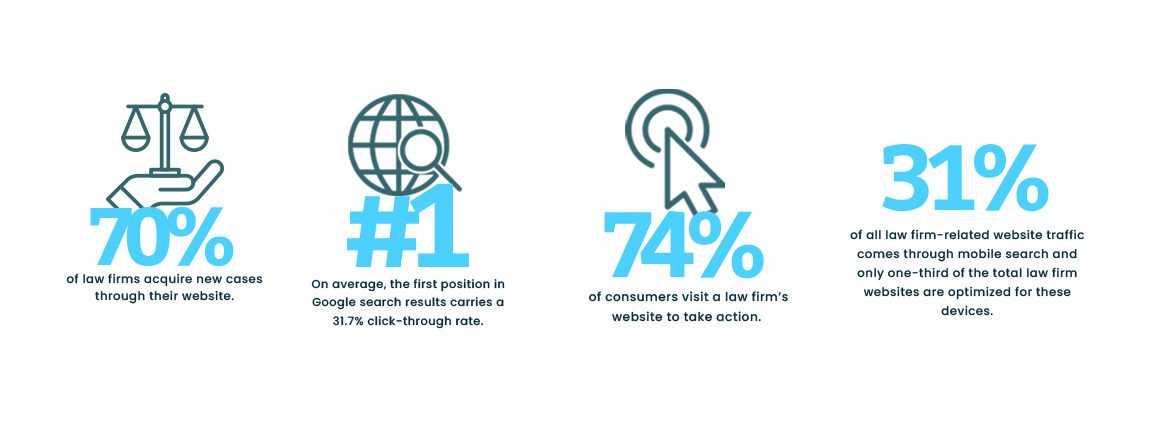
There is more to SEO (search engine optimization) than concentrating solely on keywords. Various factors of your website’s design will impact how search engines search and index your site. As a result, it can be challenging for search engine crawlers to access your pages by using the incorrect website style or structure might decrease your rankings.
Your website may generate endless leads if designed to attract organic traffic and conversions. A landing page’s conversion potential depends on several variables, but engaging directly with your target market should be your first focus.
Knowing who they are and understanding their fundamental demographics, what motivates their purchase decisions, and what they like and hate can give you the base to create a website that appeals to them.
Unlike what many lawyers might think, there are several reasons why people visit law firm websites other than just hiring them. Some of these reasons include:
This is why it’s important to target different types of keywords and create content that correlates with their search intent.
Search Intent (also known as “User Intent”) is the main goal a user has when typing a query into a search engine.
To keep things simple, we like to think of search intent within 3 main categories when it comes to law firms: Informational, Commercial, and Navigational.
Matching the search intent of the users could be one of the most important pillars when it comes to content marketing. If a visitor gets what he’s looking for he’s probably going to take the action you want them to take. Just as simple as that.
A prospective customer is knowledgeable of their dilemma. Let’s take the scenario where a delivery driver has to contact a nearby lawyer after having an accident. What should I do if I get harmed at work? Additionally, “what kind of lawyer do I need if I get hurt at work” are searches they conduct on Google.
The driver is searching for insightful information that addresses his problems. This information could come from educational blogs/articles, ebooks, tutorials, films, and whitepapers are all examples of effective awareness-stage material.
The delivery driver now knows what to do next and what sort of lawyer he needs. He does an online search for a workers’ compensation attorney. He focuses on three promising possibilities and spends some time doing so.
The consideration stage consists of case studies, workshops, publications, and comparisons. At this phase, you’re attempting to prove that you can provide the optimum solution to the client’s issue.
When the driver has made a choice, he understands who he should call. He’s decided on a course of action and will pick up the phone or submit a form to contact a lawyer. Law firm marketing aims to brand your business as the leading resource and service provider.
One client’s case can be wrapped up when another client’s process is just starting. Suppose your client has a good experience and observes that you are actively involved. In that case, they will be more likely to recommend you to friends and family members should they ever find themselves needing legal representation.
Additionally, the advocacy stage is about being active on social media and engaging with prospective clients.
Information architecture is known for website content organization and branding for usability and discoverability. IA significantly impacts website content organization and navigation.
Making content on the web more straightforward for the intended audience to “discover” through search engines is an objective that both IA and SEO practitioners share.
What’s more, good site architecture is also a huge factor in your site’s correct indexability. This means Google will be able to find, crawl and rank all your website’s pages.
Keep in mind it’s essential to analyze and decide what structure you utilize based on your site’s own needs. Some of the factors you have to take into account when designing your IA are:
A quick great tip is going user-first. Keep in mind what’s important is that your site is simple, functional, and enjoyable for your visitors. This inevitably will lead your site to be SEO-friendly as well.
In November 2016, desktop usage was exceeded by mobile and tablet usage, and the ratio has increased steadily over time. You should make sure your website design is smartphone accessible because Google now factors in smartphone accessibility as a significant ranking factor.
Desktop displays are more expansive than mobile ones. Therefore, you should make sure of a few basics:
You can always use the help of some tools to make sure your site is running smoothly and get along with google’s standards. The best one to go for sure is Google Search Console, a diagnostic should be ready once you have set your website up. We recommend you check it regularly.


Another great free tool we use and can recommend you to try is Google’s Page Speed insights (often called Lighthouse as well). Not only you’ll be able to check your desktop vs mobile performance but also some other important metrics and ranking factors such as Core web vitals.
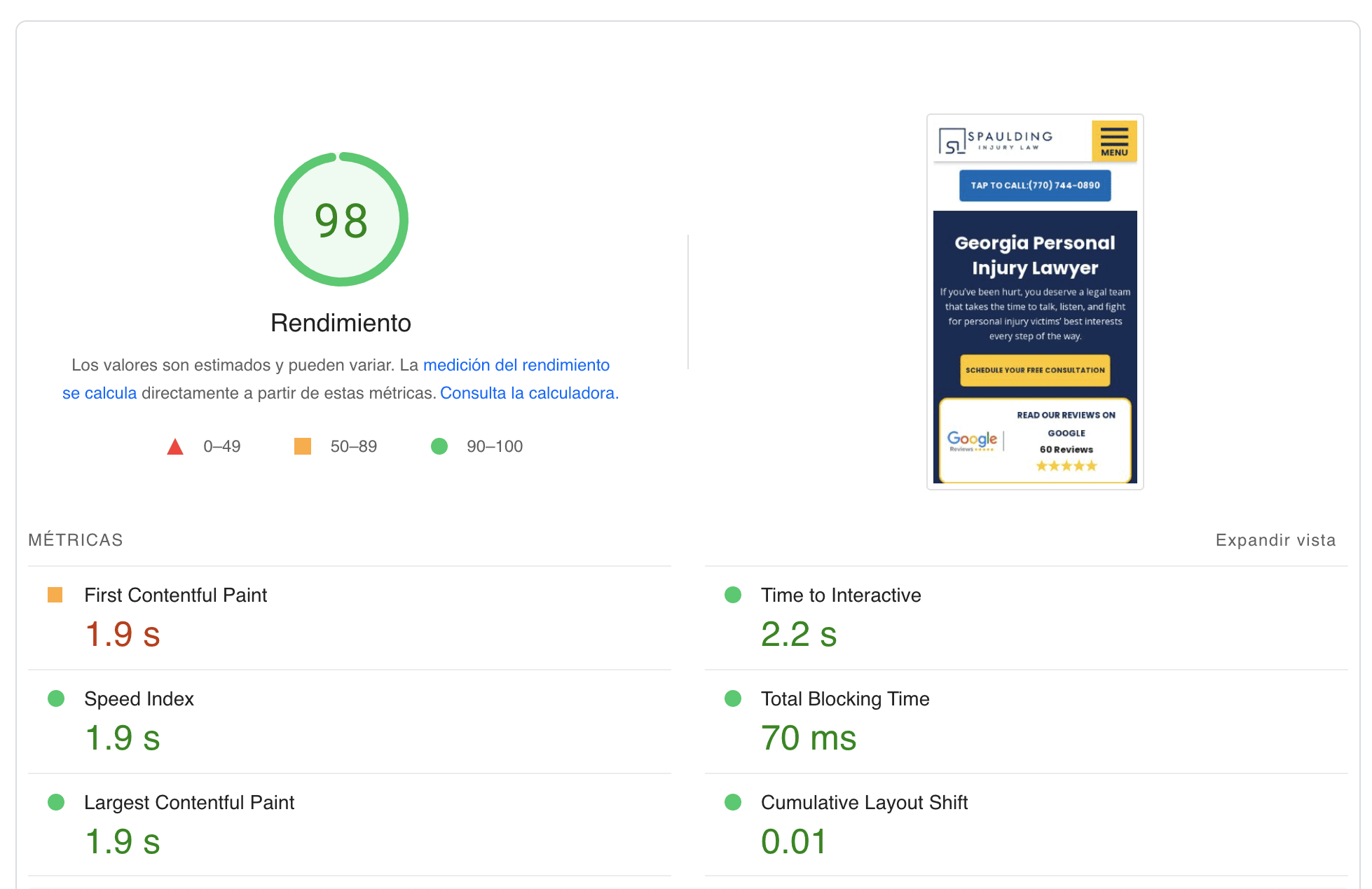

At this point, you might wonder if hiring SEO services worth the time, money, and effort investment.
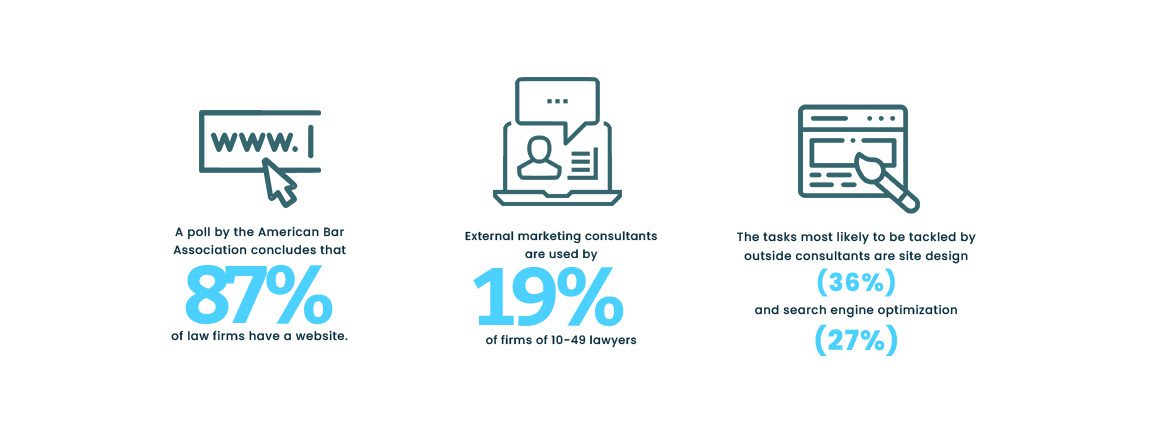

The relevance of search engine optimization, or the process of making your website appear higher in search engines like Google or Bing, cannot be overstated when people search for your legal services online.
This indicates that the best way to guarantee your website is at the top of search engine results, or at the very least, on the first page, is to have an excellent SEO strategy.
Therefore, if you want your law practice to remain competitive and continuously draw high-quality leads, investing in a law firm SEO expert is not a bad idea.
Since most individuals searching for legal counsel do so online, SEO is essential for law businesses. Ninety-six percent of clients look online for a lawyer, and 70 percent of legal firms get new cases via their websites. This implies that if you’re trying to attract potential clients for your business, a significant factor in your success becomes whether or not your website shows up at the top of an average Google search.
When comparing PPC with SEO, there are three major distinctions:
As a result, PPC and SEO frequently perform best when skillfully combined.
Similarly to our comparison with PPC, LSA is a type of paid media that can offer great results as long as you have the budget to support it for a long period.
You won’t discover typical items in these results since LSAs are only for services that Google has approved for advertisement and validated. LSAs provide a more direct method for qualifying leads and acquiring new clients. You merely need to be Google certified and have the extra money in your budget; you don’t need to develop your site or make specific landing pages.
Social media and SEO are vital in your marketing plan, and each has advantages. Additionally, both inbound marketing solutions support bringing pertinent visitors to your website. The driving force behind obtaining top ranks on search engine results for searches is SEO. The proper SEO approach raises your visibility and generates more organic leads.
On the other hand, a social media strategy plan focuses on social networking sites like Facebook, Twitter, Instagram, and YouTube. These channels are utilized for advertising goods and services you present and are becoming an ever-more-essential instrument for reaching your marketing goals. They are also a platform to raise brand recognition.
Targeted marketing has been explored using TV advertising. It’s great for boosting your law firm’s brand recognition but it falls short of web marketing’s ability to focus on a targeted group for marketing goals. In addition, online marketing strategies provide a level of versatility unparalleled by any other media. A firm may modify individual advertising, edit content, or change the entire direction of a marketing campaign in a matter of minutes.
While specific management and analytics techniques are available for TV advertising, virtually every activity can be collected and evaluated for internet campaigns. For example, you may use internet analytics to find out how your targeted audience behaves through different strategies, from the number of emails to the number of clicks on a website or Google searches.
Take Blackburn Romey (a current client of ours) as a great example of this method. They do an annual motorcycle giveaway as a branding/promotion effort to get involved with the bikers community across Indiana.
The TV advertisement for itself would be a good off-line branding effort but nothing more. What we actually do is sent those leads to our website where they can find a landing page to register for the contest.


The result is a massive track peak of traffic which is both good for SEO purposes, but also for being able to track metrics such as sessions, conversion rate (% of visitors who sign up) that can help us optimize our campaigns, and finally, compile a nice database for further marketing purposes later on.
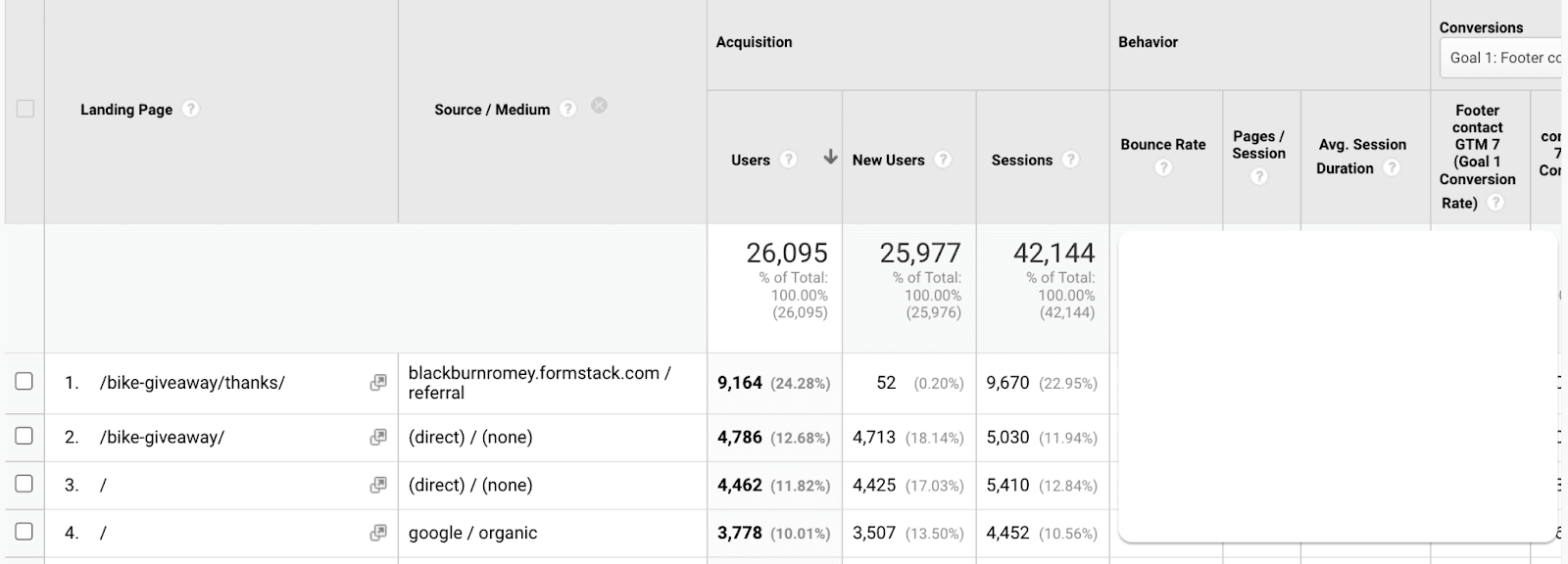

As we already have mentioned, there’s no need for offline and online marketing strategies to be enemies. They can actually work pretty great together.
There is a high probability that the significant neighborhood nonprofit or charity you support has a website. These websites draw a lot of solid incoming connections from media and other prominent businesses. Given that one of the main components of the local ranking pack is relevance, a link from one of these websites might work wonders for your relative positioning in Google.
Furthermore, backlinks increase your importance in the neighborhood from regional businesses. This can draw in more clients for your law firm.
SEO for law firms is the technique of customizing certain web pages from your legal firm’s website to emerge when a user searches for a particular phrase in the viewable sections of search engine results pages or SERPs.
The legal profession is among the most competitive in SEO; therefore, outperforming and outranking rivals will involve implementing comprehensive strategies. Identifying the right keywords and designing the right content is only the beginning.
Finding the right terms and queries that users manually search for on Google is known as keyword research. When you’re a lawyer, keyword research supports your attempts to improve name recognition and provide potential clients with a simple way to contact you.
Many other components of search engine optimization are accomplished by keyword research when implemented efficiently. Spending money on content development can improve your practice in the long run by enhancing awareness and conversions/case acquisition.
“Content is king”. As we already talked about in the search intent section the content depends on the search intent and this, in turn, depends on the nature of the keyword itself.
Most of the time for commercial ones the end game will be to lead the client to hire an attorney. However, it should also inform clients about the law firm’s services.
Content marketing should be focused on providing the visitor the most value we can and, then, once that is covered, encourage potential clients to take particular actions, such as acquiring the material they require for their legal problems. In addition, content “archetypes” is used to create content with specific objectives, such as rankings, conversions, and information sharing.
Some of the most common types of pages for lawyer websites often are:
These pages include different formats of content such as:
On-page optimization for law firms is essential. All actions made within the website to raise its ranking in the search results are referred to as on-page optimization (also known as on-page SEO).
Finding the ideal balance between supplying the proper information to search engines and preserving what your clients view on the page is the goal of on-page optimization. On-page optimization includes your meta descriptions, title tag, header tags, SEO writing, images, keywords, link building, and ensuring content on your page aligns with the searcher’s intent.
Backlinks are the cornerstone of Google’s algorithm and the fundamental means of getting from one website to another worldwide. Since the beginning, links have been a crucial component of Google’s algorithm and a huge ranking factor. Their amount and quality are still substantial today.
Link-building is, at its most basic, the process of acquiring links from other websites that point to a specific website. Usually, content is included in an HTML anchor element with the “href” property to create a link (or hyperlink).
A solid link-building strategy may boost your SEO and enhance your search engine rankings. This is because reputable websites with pertinent content are where inbound links should flow from.
There are many ways to acquire backlinks. The purest form of backlink acquisition is based on valuable (linkable) content. Depending on your objectives, the content can be compiled into specific formats like:
These are what we often refer to as “linkable assets”.
Other topics you should consider when trying to build a new backlink are the site’s authority, no-follow vs do-follow, and the nature (context) of the site you’re getting the backlink from.
As you can deduce, link building is a broad topic and it’d be impossible to talk about everything in this small section of the blog. If you want to dive further make sure to take a look at our link building for lawyers.
Often underestimated. Internal linking (when done the right way) is one of the most powerful resources to rank your internal pages. We can categorize their benefits into two main blocks:
Businesses and organizations can efficiently handle their web presence throughout Google using the Business Profile tool. You may modify your company information and authenticate your business to make it easier for people to locate you. This is essential for law firms.
Having a well-optimized GMB listing also gives your business the chance to be on the Google maps results and the 3-pack (often called “local pack” as well).
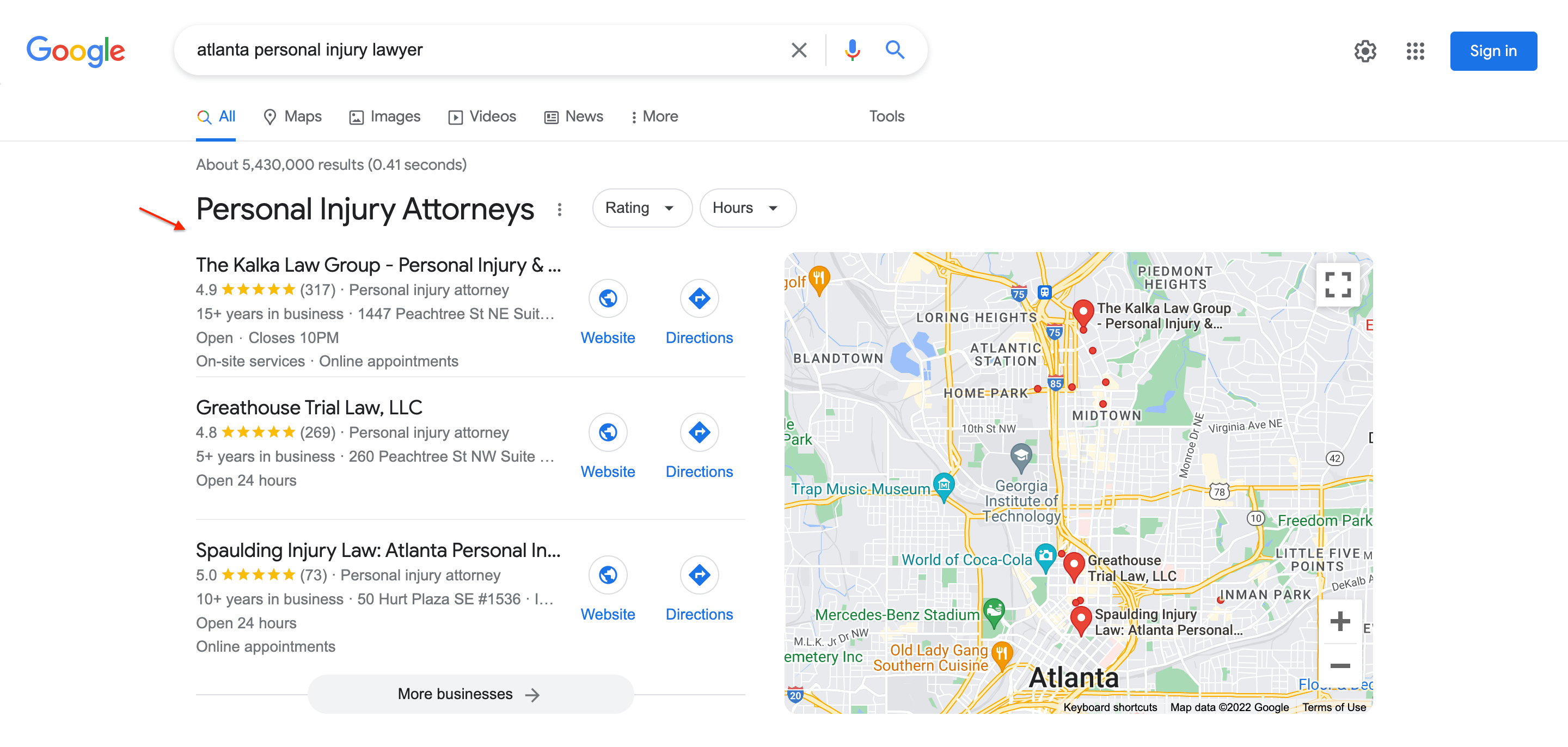

As you can see, the opportunity to earn increased visibility can be significant since this section of the SERP is located at the top of the page, just above actual organic rankings.
Have in mind that this section will only appear for some types of keywords (most of the time the commercial search intent ones). A common instance in the law firm industry is the traditional keyword formula: [City] + [Practice Area] + [lawyer/attorney]


Going for Local SEO is a strategy that can increase the visibility of your company in Google’s local search results and it’s pretty much mandatory when it comes to companies that have a physical address or offers services to a specific region. Targeting customers in a particular area is part of local SEO.
This is particularly important for many reasons. But if we’d need to choose the main one, it’d be simple: “Being able to compete”. Think about it, trying to compete for the keyword “family lawyer” alone would be virtually impossible because you’d be pushing against all the lawyers in the whole country. Going for “Austin family lawyer” would be much more feasible and profitable.
Following the same example. If you practice family law in Austin, Texas, you should appear on Google searches for “Austin family lawyer” or “family lawyer near me.”
Being successful on Local SEO is all about showing the most local signs you can to google’s algorithm. This can be achieved by optimizing GMB listing, creating nice site architecture, standardizing NAP across all your on-page and off-page SEO efforts, and more.
Having a nice so-called website’s “health score” is imperative for your SEO strategy.
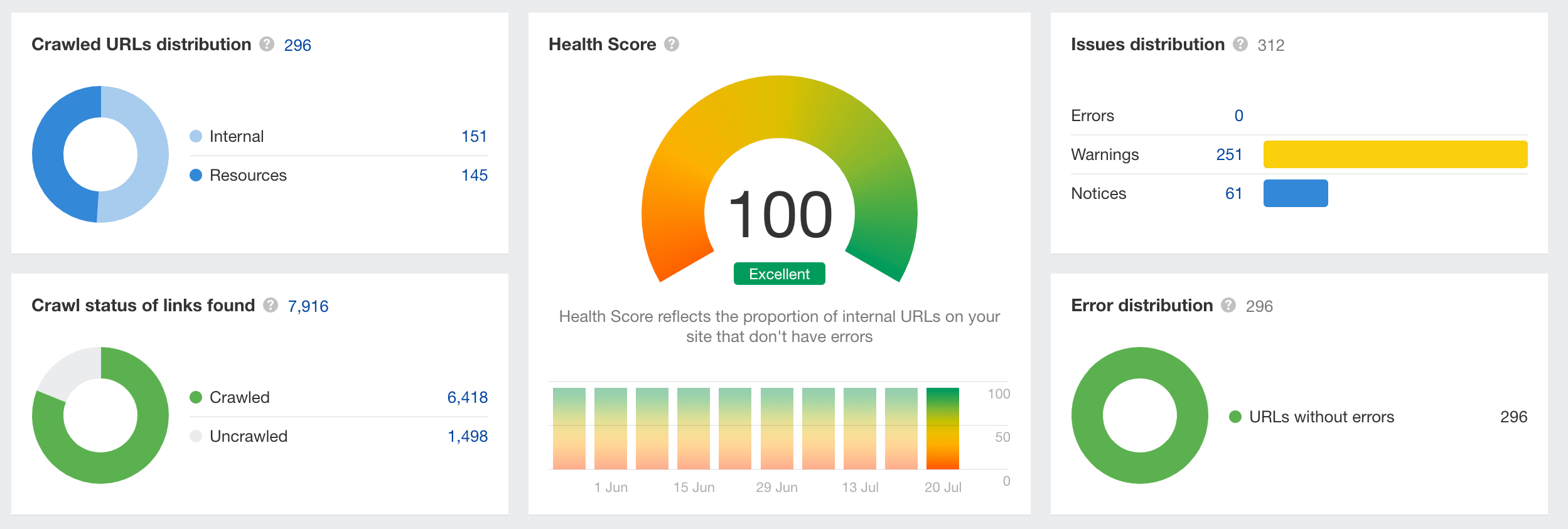

You should be interested in constantly monitoring and fixing any types of errors within your website. The types of existing errors are almost infinite and finish mentioning them all would be impossible for this blog but some of the most common are:
Some of them will require a minimum effort to be fixed but others will be complicated for someone not familiar with coding, so a dev team will always come in handy.
Now in terms of detecting these issues, the best way to go here is to use a troubleshooting tool such as:
While KPIs (key performance indicators) and measurement strategies are undoubtedly helpful in gauging the return on investment for lawyer SEO, you won’t see changes or results immediately.
This is due to the high degree of competition in the legal sector. Law firms need a considerable amount of website content to rank using particular keywords. It might help you stay optimistic and move closer to your long-term objectives if you know that timeline when you begin a whole SEO campaign.
Handling the conversation about your legal services in public places is the technique of reputation management. Reputation management for lawyers may center on public review websites that compile feedback from a range of sectors, not simply the legal one.
Typical sites include Facebook, Google My Business, and Yelp. In addition, review solicitation requests client reviews, which can be difficult for lawyers because rules may change from jurisdiction to jurisdiction. However, landing online evaluations on Google and other review sites is crucial for expanding your legal company.
Keeping track of Key performance indicators for SEO is essential for a successful SEO strategy. There are many of them and choosing them really depends on what you want to know.
Therefore. When we want a very general view, our team monitors six main key performance indicators (KPIs):
Here are some of the best and most frequently used search engines for lawyers:
Google will precede educative, informative, and pertinent articles to a user’s search. After all, it wants to give people the most accurate information possible. So what does Google prioritize when determining what’s “best”?
When ranking a law firm’s website, Google’s algorithm checks more than 200 factors, including:
Any additional component that modifies the standard format of a search result is referred to as a SERP feature. Google refers to these as “search features” or “search result features.” For a user-friendly search engine experience, the business continually evaluates and enhances these elements.
Some of the most typical SERP elements for lawyer-related topics you would find on Google include:
The SERP look will depend a lot on the type of query you are searching for. For commercial keywords such as “personal injury lawyer” or “criminal defense attorney” the results page will look like this:
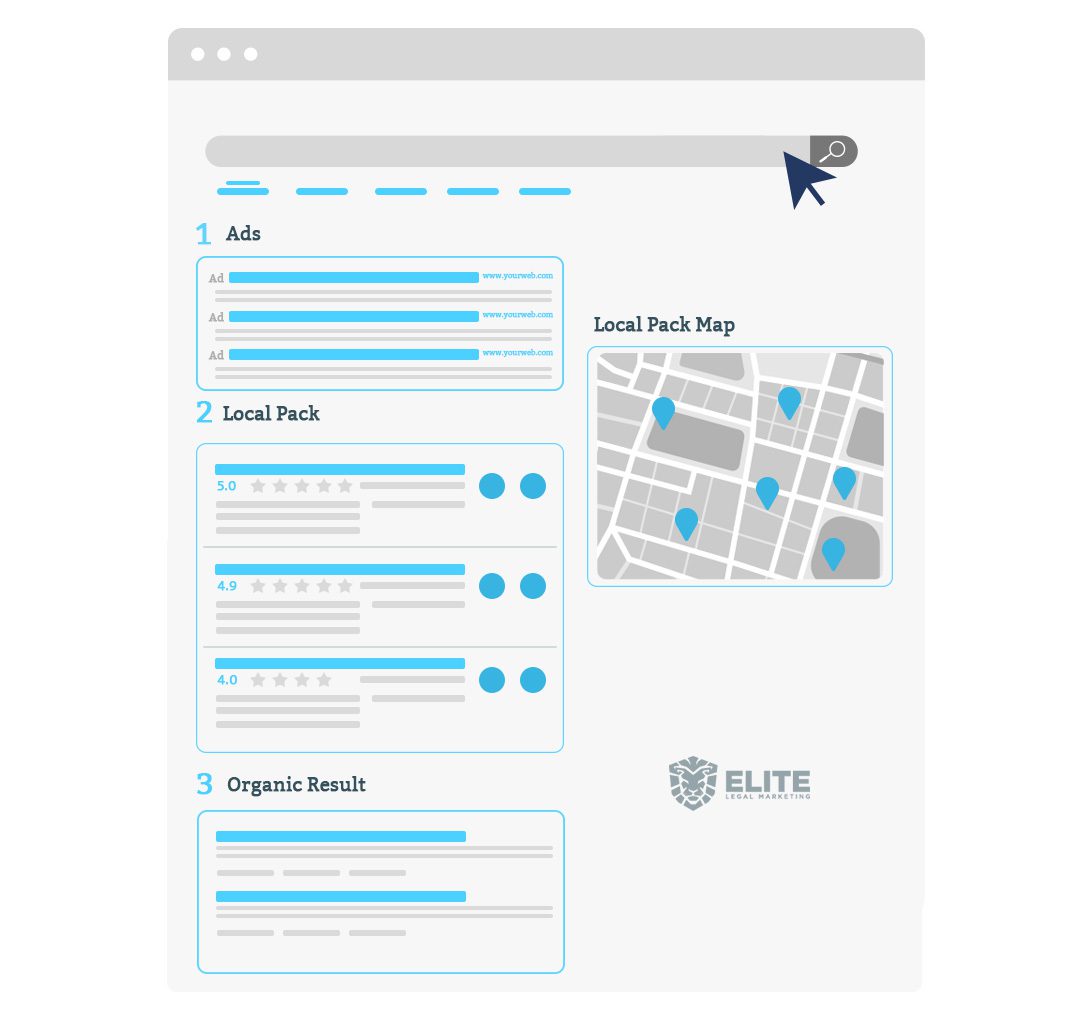

For articles, blogs, and semantic keywords (typically denominated as “informational keywords”), the results page will look somewhat like this:


There is just no way to offer an answer, given the number of variables involved. Numerous factors are regarded while optimizing your website, and you must also consider the optimization efforts of your rivals. SEO growth is based on the following three crucial aspects, which affect how long your SEO will take:
For success to be long-lasting and consistent, goals must be set up and measured. However, most law firm marketing colleagues and SEO experts agree that it takes six to twelve months to improve your SEO-related traffic and conversions.
Your law firm’s success is increasingly dependent on how effortlessly people can discover you online as more and more prospective clients use internet searches to assist them in picking their legal counsel.
But it’s challenging to stand out in the extensive internet environment; it takes knowledge and time that most attorneys don’t have to spare. Therefore, SEO services for lawyers are results driven.
For prospective new clients to find your business, search engine optimization (SEO) helps increase website traffic. SEO is a complex, time-consuming, and continual process, even though its purpose is simple. You may look to SEO specialists to improve your law firm’s search engine performance and eventually increase revenue, just as your clients visit you for your legal knowledge and skills.
If you’re a lawyer in high demand, clients should direct your effort and attention, which is what matters. You might have the chance to achieve that while also improving the likelihood that the website for your business will rank by hiring an attorney SEO company.